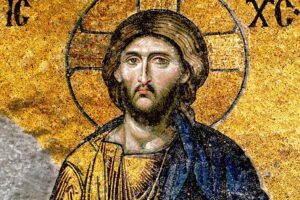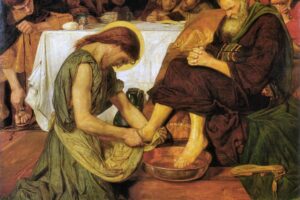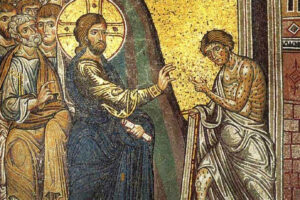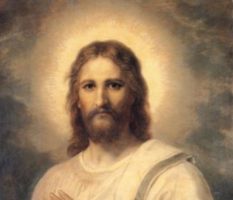Last edited and revised on 22/Jan/2024
For a shorter article on who Jesus is, please see the below article:
The Bible’s Answer
Introduction
2,000 years ago in the land of Israel, Jesus of Nazareth, who was a very controversial teacher and preacher of that day, both hated and loved by many, asked his twelve disciples “Who do people say that I am?” (Mark 8:27; Matthew 16:13). The disciples answered him, “Some say John the Baptist, others say Elijah, and others Jeremiah or one of the prophets” (Matthew 16:14).
As the disciples’ answer suggests, there were many different opinions and beliefs about him, and none of them seemed to be in agreement with one another. But getting right to the heart of the matter, Jesus pressed further and asked them “But who do you say that I am?” (Matthew 16:15). We can see from Jesus’ answer that he was not concerned about what peoples’ contradictory opinions and thoughts were about him, but rather about what his disciples, his closest followers, believed about him.
Jesus’ main point of concern was if they truly knew who he was, despite what everyone else thought of him. Although his question was directed towards the disciples, we can also apply it to today’s context. To the reader of this article, Jesus also poses you the question “But who do you say that I am?” Who do you believe Jesus is despite what the world and earthly people and religions teach about him? You may have some idea of who he is, but do you really know Jesus in the way he would like you to know him? To answer the important question of who Jesus really is, let us allow the Bible to speak for itself and see.
Information on Jesus and His Ministry
The Beginning of Jesus’ Ministry
The Bible tells us that Jesus was a Jew who was born in Bethlehem of Judea (Matthew 2:1), and who grew up in Nazareth (Matthew 2:23). His parents on Earth were Mary and Joseph (Matthew 1:18). He also had brothers and sisters, and before his preaching ministry began, he worked as a carpenter (Mark 6:3). However, Jesus’ birth was unlike any other birth, because he was born of the Virgin Mary, who conceived him miraculously by the power of the Holy Spirit (Luke 1:31–35).
At around 30 years of age (Luke 3:23), Jesus was baptised by John the Baptist (Matthew 3:13–17; Mark 1:9–11; Luke 3:21–22; John 1:31–34), and this initiated his ministry of preaching the kingdom of God and the gospel (Mark 1:14–15; Luke 4:42–44), of performing miracles, casting out demons (Mark 1:23–26), and healing people (Matthew 4:23–25). After he was baptised, he went into the wilderness to fast for 40 days and straight after he was tempted by Satan (Matthew 4:1–11; Luke 4:1–13). He conquered three of the devil’s temptations by correctly quoting him the holy scriptures of the Old Testament, and did not give in, even though he was famished. After this he returned to Galilee to begin his ministry of preaching and healing (Luke 4:14–15).
Jesus’ Healing Ministry and Miracles
When John the Baptist was put in prison due to persecution, he sent his disciples to Jesus, asking Jesus if he was the one who is to come (the Messiah) (Luke 7:18–20). It also says that at that hour Jesus had healed many people and cast out evil spirits (Luke 7:21). Jesus then said to John’s disciples:
Go and tell John what you have seen and heard: the blind receive their sight, the lame walk, lepers are cleansed, and the deaf hear, the dead are raised up, the poor have good news preached to them. 23 And blessed is the one who is not offended by me. — Jesus Christ (Luke 7:22–23)
Here we can see that Jesus healed many people, such as those who were blind, lame, deaf, demon-possessed, and that he rose people from the dead, and that these bore witness to him being the Messiah. Other passages of scripture testify to Jesus having compassion on thousands of people, and healing them:
Jesus went on from there and walked beside the Sea of Galilee. And he went up on the mountain and sat down there. 30 And great crowds came to him, bringing with them the lame, the blind, the crippled, the mute, and many others, and they put them at his feet, and he healed them, 31 so that the crowd wondered, when they saw the mute speaking, the crippled healthy, the lame walking, and the blind seeing. And they glorified the God of Israel. (Matthew 15:29–31)
Now when the sun was setting, all those who had any who were sick with various diseases brought them to him, and he laid his hands on every one of them and healed them. (Luke 4:40)
Jesus’ miracles were not just related to healing or casting out unclean spirits/demons. In fact, The first miracle Jesus performed was at a wedding at Cana, where he turned water into wine (John 2:1–12). We can see from Jesus’ life that he also had power over nature. When Jesus and the disciples were sailing to the country of the Gerasenes, Jesus calmed a storm that threatened to sink them just by saying “Peace! Be still!” (Mark 4:35–41). Jesus’ power over nature can also be seen by the way he could walk on water:
And in the fourth watch of the night he came to them, walking on the sea. 26 But when the disciples saw him walking on the sea, they were terrified, and said, “It is a ghost!” and they cried out in fear. 27 But immediately Jesus spoke to them, saying, “Take heart; it is I. Do not be afraid. (Matthew 14:25–27)
Jesus’ Apostles and Disciples
Jesus appointed twelve men as apostles in his ministry to be his closest followers, some of whom were Peter, Andrew, James, and John (Mark 3:13–19). At times, Jesus would send them out to preach, and gave them authority over demons and to heal people (Luke 9:1–6). But most of the time, Jesus did this himself while his apostles and disciples followed him and witnessed the miracles. Jesus’ apostles also baptised people on his behalf (John 4:1–2). There were other disciples who followed Jesus as well, including some notable women, such as Mary Magdalene, Joanna, Susanna, and many others (Luke 8:1–3).
Jesus’ Parables and Ethical Teachings
Jesus often taught people in parables, and used everyday examples in them. One example is the parable of the sower, in which farming illustrations were used (Mark 4:1–20). Jesus used many parables in describing what the kingdom of God/Heaven is like, such as the parable of the mustard seed and leaven (Matthew 13:31–33). He used parables to warn people of Hell, the place where people who do not repent and believe the gospel go, such as the parable of the narrow door (Luke 13:22–30). Jesus also corrected his opponents’ beliefs or attitudes on others (such as sinners) through the use of parables, such as his parable of the lost sheep:
What man of you, having a hundred sheep, if he has lost one of them, does not leave the ninety-nine in the open country, and go after the one that is lost, until he finds it? 5 And when he has found it, he lays it on his shoulders, rejoicing. 6 And when he comes home, he calls together his friends and his neighbours, saying to them, ‘Rejoice with me, for I have found my sheep that was lost.’ 7 Just so, I tell you, there will be more joy in heaven over one sinner who repents than over ninety-nine righteous persons who need no repentance. — Jesus Christ (Luke 15:4–7)
In private, Jesus would explain the parables to his followers, because they asked him about what they meant, and were interested and willing to learn (Mark 4:10; Mark 4:33–34). In fact, Jesus’ parables acted as invitations for everyone to investigate the kingdom of God; for those not willing to investigate, they would not understand.
Part of Jesus’ teachings concerned ethical issues on how we should live. One of his teachings, called the Golden Rule, is to do to others as we would have them do to us (Matthew 7:12). Jesus taught that his disciples must be characterised by the love that they show to others (John 13:34–35). Not only that, but his commandment is that we love one another. He taught that the greatest commandments are to love God with one’s all and to love one’s neighbour as oneself, and taught that all the Law and the Prophets depend on these two commandments (Matthew 22:37–40). Jesus’ parable of the good Samaritan, in which a Samaritan—who were hated by Jews—takes care of a crippled man who was attacked by robbers, teaches that our neighbour is anyone, regardless of who they are (Luke 10:25–37).
You shall love the Lord your God with all your heart and with all your soul and with all your mind. 38 This is the great and first commandment. 39 And a second is like it: You shall love your neighbour as yourself. 40 On these two commandments depend all the Law and the Prophets. — Jesus Christ (Matthew 22:37–40)
Jesus’ most radical ethical teaching, however, was that in addition to loving our neighbour, we must also love, pray for, do good to, and bless our enemies (Matthew 5:43–44; Luke 6:27–31). Jesus said that the reason why we are to do this is because God is kind both to the ungrateful and the wicked, and so we are to be merciful, even as our Father is merciful (Luke 6:32–36). No one in history has ever taught such a thing before Jesus and even after him, except for those who have been influenced by him.
Contrary to the world’s notions of greatness, Jesus taught that true greatness is found in becoming the least of all, being humble, and serving others, just as Jesus was humble, put others above himself, and served them in his ministry (Mark 10:42–45; John 13:12–17). He taught that many who are first will be last, and the last first (Mark 10:31); that whoever exalts himself will be humbled, but he who humbles himself will be exalted (Luke 18:14). He also welcomed children, blessed them, and taught that the kingdom of God belongs to such as them (Mark 10:13–16).
Jesus’ Opponents
Jesus also gained opponents in his ministry from groups such as the scribes, Pharisees, Herodians, and Sadducees. Part of the reason for this was because Jesus healed people on the Sabbath, the seventh day of the week, which is a holy day of rest. An example is when Jesus healed a man born blind in Jerusalem (John 9:1–14). The Pharisees considered healing on the Sabbath to be unlawful, but Jesus told them that he is the Lord of the Sabbath, meaning that he has authority over that day (Matthew 12:8). Once when Jesus was in a synagogue on a Sabbath, there was a man with a withered hand (Matthew 12:9–14; Mark 3:1–6; Luke 6:6–11). The Pharisees were there too.
Again he entered the synagogue, and a man was there with a withered hand. 2 And they watched Jesus, to see whether he would heal him on the Sabbath, so that they might accuse him. 3 And he said to the man with the withered hand, “Come here.” 4 And he said to them, “Is it lawful on the Sabbath to do good or to do harm, to save life or to kill?” But they were silent. 5 And he looked round at them with anger, grieved at their hardness of heart, and said to the man, “Stretch out your hand.” He stretched it out, and his hand was restored. 6 The Pharisees went out and immediately held counsel with the Herodians against him, how to destroy him. (Mark 3:1–6)
Another reason for Jesus to gain opponents, was because he claimed to be God. Towards the end of Jesus’ sermon on him being the good Shepherd, he taught that he gives his sheep (his followers) eternal life, and that no one is able to snatch them from his hand nor the Father’s. Following this, he claimed that he and the Father are one (John 10:27–30), and the Jews recognised that he was claiming to be one with God in essence, due to him having the power of granting salvation. The passage is as follows:
My sheep hear my voice, and I know them, and they follow me. 28 I give them eternal life, and they will never perish, and no one will snatch them out of my hand. 29 My Father, who has given them to me, is greater than all, and no one is able to snatch them out of the Father’s hand. 30 I and the Father are one.” 31 The Jews picked up stones again to stone him. 32 Jesus answered them, “I have shown you many good works from the Father; for which of them are you going to stone me?” 33 The Jews answered him, “It is not for a good work that we are going to stone you but for blasphemy, because you, being a man, make yourself God. (John 10:27–33)
Jesus also spoke against groups such as the Pharisees and the scribes at times for their hypocrisy, disbelief, and for making their traditions overrule God’s word (Mark 7:1–7).
Jesus’ Death and Resurrection
At certain periods during his ministry, Jesus predicted his death and resurrection (Mark 10:33–34; Matthew 20:17–19). After three years of his ministry, the scribes, chief priests, elders and Pharisees condemned Jesus as worthy of death by crucifixion. They charged him with blasphemy for claiming to be the Son of God (Jesus did not actually blaspheme, because he is the Son of God) (John 19:7). A crowd with swords and clubs came to arrest Jesus (Matthew 26:47), and seized him. In an attempt to protect Jesus, his disciples wanted to fight them.
And when those who were around him saw what would follow, they said, “Lord, shall we strike with the sword?” 50 And one of them struck the servant of the high priest and cut off his right ear. 51 But Jesus said, “No more of this!” And he touched his ear and healed him. (Luke 22:49–51)
They then led him away to put him on trial and falsely accuse him. Jesus was crucified outside the city gate of Jerusalem, between two criminals (Matthew 27:32–38). Although he was whipped (John 19:1), beaten (Matthew 26:67–68; Matthew 27:27–31), mocked, and blasphemed (Matthew 27:27–31; Mark 15:29–32), Jesus still had compassion on them. While hanging on the cross, he prayed:
Father, forgive them, for they know not what they do. — Jesus Christ (Luke 23:34)
He died at about the ninth hour (that is, about 3pm) (Matthew 27:45–50), and was buried in a tomb (Mark 15:42–47), which was kept secure by guards and blocked by a boulder (Matthew 27:62–66). On the third day, Jesus rose again from the dead physically (Mark 16:5–6; Luke 24:39), and he appeared to many of the disciples (John 20:19–20). He first appeared to Mary Magdalene (John 20:14–16). Jesus taught that his suffering, death, and resurrection were prophesied in the Old Testament, and that he came to fulfil the Scriptures.
These are my words that I spoke to you while I was still with you, that everything written about me in the Law of Moses and the Prophets and the Psalms must be fulfilled.” … “Thus it is written, that the Christ should suffer and on the third day rise from the dead, 47 and that repentance and forgiveness of sins should be proclaimed in his name to all nations, beginning from Jerusalem. — Jesus Christ (Luke 24:44–47)
After rising from the dead, Jesus appeared to the disciples for 40 days, presenting himself alive with many proofs, and telling them about the kingdom of God (Acts 1:3). After commissioning the disciples to baptise and make disciples of all nations, Jesus ascended to Heaven (Matthew 28:19–20; Luke 24:50–53). Some other scriptures that are fulfilled by Jesus would include Jesus’ birth according to Isaiah 9:6:
For to us a child is born, to us a son is given; and the government shall be upon his shoulder, and his name shall be called, Wonderful Counsellor, Mighty God, Everlasting Father, Prince of Peace. (Isaiah 9:6)
Notice how the Bible calls Jesus God, because he fulfilled a prophecy which was applied to God. This is very significant. Another prophecy concerning God can be found in Zechariah 12:10, which says that the people of Israel will look upon God whom they have pierced and mourn for him. This was fulfilled by Jesus in John 19:33–37, when a soldier pierced Jesus’ side with a spear straight after he had died on the cross. There are many more Old Testament prophecies concerning Jesus.
Jesus, the Holy Spirit, and His Second Coming
Before Jesus died, he taught his disciples that he would send them the Holy Spirit to be with them forever (John 14:16–17) after his death and resurrection (John 16:7). Jesus said that the Holy Spirit proceeds from the Father, bears witness about Jesus (John 15:26), guides Christians into all the truth (John 16:13–14), teaches them and reminds them of his teachings (John 14:26). The Holy Spirit played a very prominent role in the early New Testament church of the book of Acts, where he empowered the disciples to proclaim the Word of God (Acts 4:31; Acts 9:31; Acts 10:45–46). God the Father anointed Jesus with the Holy Spirit at his baptism (Acts 10:38), and this empowered him to do his miracles. Today, Christians are temples of the Holy Spirit, because he indwells those who believe in Jesus (1 Corinthians 3:16).
Jesus will come again one day (Matthew 24:29–31), at a day and hour that no one knows or will expect (Matthew 24:36, 44; Mark 13:32–33; Luke 17:22–23), as the Final Judge to judge the living and the dead (Matthew 25:31–33). The righteous (the ones who believe in Jesus) will go to eternal life (Matthew 25:34), while the unrepentant (the ones who don’t believe in Jesus or who believe in a false Christ) will go to eternal damnation (Matthew 25:41, 46).
Jesus’ Claims and the Bible’s Claims on Jesus
Jesus Is the Messiah (Christ)
We have seen that Jesus did many good deeds, performed great miracles, taught people many things about the gospel and the kingdom of God, and fulfilled prophecies, but what did he teach others about himself? Furthermore, what does the Bible say about the person of Jesus specifically? Jesus taught that he was the Messiah (Greek: Christ). Christ is not Jesus’ last name, but it means anointed one; Jesus was anointed by God to die for the sins of the world.
The Messiah was the prophesied Saviour of the world in the Old Testament who would come to Israel as King, rescue God’s chosen people from oppression, and bring with him God’s kingdom. Jesus died for all our sins upon the cross and rose again from the dead. His claim to being the Messiah can be seen from the dialogue between him and the Samaritan woman by the well of Jacob:
The woman said to him, “I know that Messiah is coming (he who is called Christ). When he comes, he will tell us all things.” 26 Jesus said to her, “I who speak to you am he. (John 4:25–26)
Jesus Is the Son of God
Jesus also claimed to be the Son of God. Many people, both religious and non-religious, have false ideas about what Jesus being the Son of God means. From a biblical perspective, Jesus being the Son of God means that he is of the closest relationship with God the Father (John 1:1, 14, 18), that he is equal with God (John 5:18), and that he shares God’s divine nature (Hebrews 1:3). Thus, with these connotations, claiming this title is an explicit way of claiming deity, that is, claiming to be God. One instance where Jesus claimed to be the Son of God was when he was questioned by Caiaphas the High Priest:
But he remained silent and made no answer. Again the high priest asked him, “Are you the Christ, the Son of the Blessed?” 62 And Jesus said, “I am, and you will see the Son of Man seated at the right hand of Power, and coming with the clouds of heaven. (Mark 14:61–62)
Jesus Is Our Lord and Saviour
The Bible tells us most clearly that Jesus is our Lord and Saviour in the following passage:
For in this way there will be richly provided for you an entrance into the eternal kingdom of our Lord and Saviour Jesus Christ. (2 Peter 1:11)
The fact that Jesus is Lord means that he is sovereign, our master, and above everyone in authority; the fact that he is our Saviour means that he died for the sins (our wrongdoings against God and humans) of the whole world, and saves us from them if we believe in him. Jesus claimed to be Lord in John 13:13:
You call me Teacher and Lord, and you are right, for so I am. — Jesus Christ (John 13:13)
And Saviour in John 12:47–48:
If anyone hears my words and does not keep them, I do not judge him; for I did not come to judge the world but to save the world. 48 The one who rejects me and does not receive my words has a judge; the word that I have spoken will judge him on the last day. — Jesus Christ (John 12:47–48)
Jesus Is God Almighty
Jesus also claimed to be God Almighty more directly than his Son of God claims. We have already examined Jesus claiming to be one with the Father, and that by doing so he was making himself God (John 10:27–33). But now, here is an example of when Jesus claimed to be God by referring to the Old Testament Scriptures. Jesus claimed to be the first and the last, which was what God claimed to be in the book of Isaiah. This can be seen when Jesus spoke with John in the book of Revelation:
Fear not, I am the first and the last, 18 and the living one. I died, and behold I am alive for evermore, and I have the keys of Death and Hades. — Jesus Christ (Revelation 1:17–18)
And from what Revelation 2:8 teaches:
And to the angel of the church in Smyrna write: ‘The words of the first and the last, who died and came to life. (Revelation 2:8)
In the Old Testament, we can see God Almighty making this same claim:
Thus says the LORD, the King of Israel and his Redeemer, the LORD of hosts: “I am the first and I am the last; besides me there is no god. (Isaiah 44:6)
Listen to me, O Jacob, and Israel, whom I called! I am he; I am the first, and I am the last. (Isaiah 48:12)
Jesus also has God’s exclusive attributes. The Bible tells us that created beings like men or angels cannot receive worship (Acts 10:25–26; Revelation 19:9–10), only God can (Luke 4:7–8). In light of this, Jesus was worshipped on multiple occasions, e.g. he was worshipped by the wise men when he was born (Matthew 2:11), by the disciples in a boat after he walked on water (Matthew 14:33), by a man who was formerly blind (John 9:37–38), by the disciples again before he ascended to Heaven (Matthew 28:16–17), etc.
Only God is to prayed to, and the Bible teaches that Jesus is prayed to (Acts 7:59–60). Only God is the Creator of all things, and the Bible teaches that Jesus is the Creator of all things (Colossians 1:16). Only God can forgive sins, and the Bible teaches that Jesus forgave sins (Mark 2:5–7). Only God is perfectly holy and sinless, and the Bible teaches that Jesus was perfectly holy and sinless (1 Peter 2:21–22), etc. Thomas the apostle recognised his divine attributes, which led him to confessing Jesus as his Lord and his God (John 20:28–29).
The Bible teaches that Jesus was the Word, who was God. Jesus, although fully God, was at the same time distinct from God the Father. The Word created all things in existence at the very beginning of creation. The Word then became flesh and dwelt among us (John 1:1–3, 14). This was a voluntary decision, in which Jesus made himself nothing by taking the form of a servant and human (which means to become truly human), even though he was in the form of God (which means to be truly God), and could have used equality with God the Father to his own advantage (Philippians 2:5–8). As a man in the flesh, Jesus still remained fully God (Colossians 2:9). However, in the days of his earthly life, he also had to cooperate with some of the limitations of being a man, and he was also born under the law (Galatians 4:4–5).
The biblical testimony as a whole teaches that God is a Trinity of three Persons, who are the Father, Son (Jesus), and Holy Spirit; three different individuals of the one essence or divine nature. When Jesus claimed to be God, he was not claiming to be the Father, but he was claiming to have a divine nature, which makes him one with God in essence. (The Holy Trinity is discussed further in the article: “What Is the Holy Trinity?”.)
Jesus Is the Only Way to Salvation
Jesus claimed that the only way to be saved—from the righteous wrath of God against our wrongdoings and breaking his commandments—is to believe in him alone. By doing this, Jesus excluded all other teachers, prophets, organisations, religious groups, etc., which teach that one can only be saved by believing in them, or that one can only be saved by believing in them plus Jesus. Jesus said:
I am the way, and the truth, and the life. No one comes to the Father except through me. (John 14:6)
The Bible teaches that God loved the world so much that he gave his only Son, Jesus, to die for our sins, so that whoever believes in him will have everlasting life; however, it also teaches that whoever does not believe in him will face eternal condemnation or damnation:
For God so loved the world, that he gave his only Son, that whoever believes in him should not perish but have eternal life. 17 For God did not send his Son into the world to condemn the world, but in order that the world might be saved through him. 18 Whoever believes in him is not condemned, but whoever does not believe is condemned already, because he has not believed in the name of the only Son of God. (John 3:16–18)
Similarly, Acts 4:12 teaches that salvation is in no one else but Jesus, and that only he can save (Acts 4:12). Only Jesus, who never sinned in his life (Hebrews 4:15), atoned for our sins on the cross as our substitute (Colossians 2:13–14; 1 Peter 2:24), and we can’t atone for our sins through good works (Romans 3:28; Galatians 2:15–16). We simply have to believe that he is our Lord and Saviour who did this for us, and who rose again from the dead, to be saved (Romans 10:9–13). If we don’t, then we remain under God’s punishment for our wrongdoing (sins), and will go to Hell.
Jesus came not to call the righteous, but sinners to repentance (Luke 5:42). He came to seek and save the lost (Luke 19:10). He came to save the world (John 12:47). Jesus invites you, no matter who you are, to come to him (Matthew 11:28–30). Whoever believes in him will not come into God’s righteous judgement against sin, but will pass from death to eternal life (John 5:24). Jesus himself will raise up those who believe in him on the last day (John 6:40). He lives forever as our intercessor between us and God (1 Timothy 2:5), and as our high priest who secured for us an eternal redemption by his blood once and for all (Hebrews 9:11–14).
Jesus’ death on the cross was a voluntary decision, and he did this because he loves you as an individual (John 10:14–18; Ephesians 5:2; Galatians 2:20). Faith in Jesus gives us peace with God (Romans 5:1). It is God the Father’s will that everyone will be saved and come to a knowledge of the truth (1 Timothy 2:3–4). (For more information on the gospel, please see: “What Is the Gospel of Jesus Christ?” and “Why Do We Need Jesus?“.)
Conclusion
“But who do you say that I am?” asks Jesus. Are you confident now, that you can answer this question which Jesus not only asked his twelve disciples, but also us today? Do you believe in Jesus’ and the Bible’s testimony of who he truly is?
Jesus’ followers understood who he truly was. Peter answered him “You are the Christ, the Son of the living God” (Matthew 16:16). After hearing the testimony of the woman at the well of Jacob, and listening to Jesus himself, the Samaritans in the nearby village confessed “we know that this is indeed the Saviour of the world” (John 4:42). After Thomas the apostle saw Jesus after he rose again from the dead, he confessed and said to Jesus “My Lord and my God!” (John 20:28–29).
What about you? Do you believe in the Bible’s testimony of who Jesus is? Can you confess and truly believe that Jesus is the Christ, the Son of the living God, the Saviour of the world, your Lord, and your God? Who do you believe Jesus is?
See Also
- Is Jesus God?
- In What Sense Is Jesus the Son of God?
- Why Did Jesus Die?
- Did Jesus Rise from the Dead?
All scripture quotations are from The Holy Bible, English Standard Version Copyright © 2001 by Crossway Bibles, a division of Good News Publishers unless specified otherwise.







